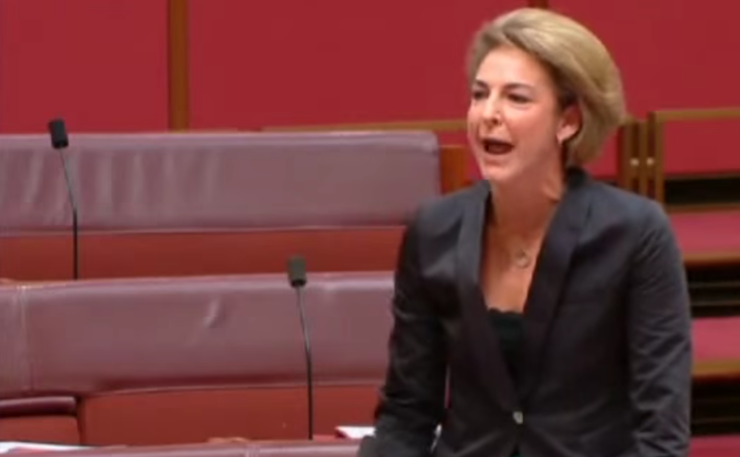Michaelia Cash misled Parliament and she should resign, writes Ben Eltham. Of course, she won’t.
The past fortnight has been one of those periods covering federal politics where you realise why the public holds politicians and journalists in contempt.
Large and important things are happening in our nation: Australia is still involved in a war in Afghanistan and in Syria, the situation on Manus Island is at crisis point, while the National Disability Insurance Scheme is in deep trouble, and tens of million of calls to Centrelink go unanswered. The Great Barrier Reef is dying.
Despite this, politics and the media spent another week turned inward, embroiled in the never-ending citizenship saga and examining the issue of whether Coalition frontbencher Michaelia Cash lied to Parliament.
The Cash scandal is important, of course, but not for the narrow aspect of Cash’s conduct and ethics. It’s important because of what it tells us about a government obsessed with attacking trade unions in a time of stagnating wages and living standards.
What is this all about? Last Tuesday, the Australian Federal Police raided the offices of the Australian Workers Union in Sydney and Melbourne. The AWU found out when a number of journalists turned up. The Feds rocked up 15 minutes later. The media had been tipped off by the minister’s media advisor, a fellow named David De Garis, as BuzzFeed’s Alice Workman established just hours after the raid.
I’ll set your mind at rest on this issue. Michaelia Cash lied. Of course she lied. Nothing could be more obvious. In a democracy that respected Westminster convention, she would now resign. But we don’t have one of those any more, not really, and so she won’t.
Let me reprint the transcript of Senate Estimates last Wednesday night. Cash was asked whether she or anyone from her office had tipped off the media about the raid. Five times, Cash said no. In doing so, she misled the Senate.
I can assure you that I found out about the raids as they unfolded on the television. I can also assure you that my office did not find out about the raids until after they were being conducted.
But Cash was wrong. Someone from Minister Cash’s office had indeed tipped off the media: David De Garis, one of her spin doctors. Cash claims she didn’t know about it. This claim is not very convincing.
Ask yourself this question: how plausible are Cash’s denials? Here we have a key staffer for the Minister for Employment, informing journalists about a raid of one of the nation’s most important trade unions. Do we really think he just picked up the phone on his own volition? Without bothering to tell his boss? Do we really believe Cash didn’t know there was a raid planned? Do we really believe Malcolm Turnbull didn’t either?
As alleged crimes go, this wasn’t a particularly serious one. The police were looking for documents sought by the Registered Organisations Commission, the new regulator of unions and employer associations set up by the Turnbull government this year. The ROC is headed by a former ASIC regulator with ties to the Liberal Party, Mark Bielecki.
Supposedly, the documents sought by the ROC were minutes of an AWU meeting held 12 years ago, in which the union, then headed by Bill Shorten, had decided to donate $100,000 to a fledgling campaign organisation calling itself GetUp.
It was then, and is now, totally legal for a union to donate money to a civil organisation like GetUp, so exactly why the ROC is so interested in the GetUp donation remains something of a mystery. It may be that the correct paperwork wasn’t in order. If so, this is surely the most well-resourced police pursuit of missing meeting minutes in Australian history.
Even worse, the ROC was then forced to admit that the AWU had already surrendered the relevant documents to Dyson Heydon’s Trade Union Royal Commission. A simple search of the relevant archives would have returned them.
But searching the archives is so much less telegenic than a raid of a major union in the full glare of TV cameras. And so we had the spectacle of more than 30 Australian Federal Police officers and ROC staff turning up in two different cities – accompanied by the media – to inspect the AWU offices.
The fact that this investigation pertains not just to the AWU but to GetUp, a group whose campaigning ability profoundly scares the Coalition, only strengthens the suspicion that the raid was politically motivated. Little else would seem to explain the keen interest in a legal donation more than a decade old.
With the implosion of the Coalition’s latest anti-union media stunt, Michaelia Cash’s career has been badly damaged. She was already under fire for the revelation that her hand-picked appointment Nigel Hadgkiss had broken the law while boss of the Australian Building and Construction Commission, forcing his own and a senior deputy’s resignation. Cash knew he had broken the law, but withheld the information for months.
Cash’s failed media stunt also brings into focus the broader pattern in which this government has used politicised commissions and investigations to pursue its enemies. After taking office in 2013, royal commissions into the union movement and the Australian Labor Party were called which saw Kevin Rudd, Julia Gillard and Bill Shorten hauled in for public questioning.
In particular, the Coalition has been at great pains to try and weaken the forces of organised labour. Anti-union bodies were created in the form of the Australian Building and Construction Commission and the Registered Organisations Commission, both transparently stacked with figures hostile to the union movement. Vast resources were expended on the Trade Union Royal Commission, for meagre results in terms of prosecutions. It is true that the Health Services Union was a swamp of corruption, and that there were isolated incidents of malfeasance in the CFMEU and TWU. But the broader union movement has emerged from the TURC in surprisingly good standing.
There is little evidence that trade unions are out of control. Despite a growing economy and strong job growth, wage growth remains at a two-decade low. Private-sector workers are less likely to be unionised than ever. Wages and conditions are generally set by employers. Insecure and precarious labour is rife.
Perhaps the most obvious illustration of the powerlessness of labour is the percentage of the economy devoted to wages, versus profits. Profits are up. Wages are flat. Workers may not necessarily understand the economics of the break-down of the Phillips curve. But they are keenly aware that their wages are barely rising, their working conditions are getting less secure, while many are having their penalty rates stripped away.
Indeed, it may be that the government’s union busting has created a backlash. Unions are certainly not held in high esteem by the general population, but for those prepared to look, there are the beginnings of a renaissance in Australian organised labour. As wages stagnate while corporate bosses rake in tens of millions, workers are starting to rediscover the value of a collective voice. It helps that the new boss of the ACTU, Sally McManus, is the movement’s most articulate and persuasive figure in a generation.

As for Michaelia Cash: she is refusing to resign, even though she should. Perhaps you can’t blame her: no-one resigns for misleading Parliament anymore. It’s just another example of the declining standards of political integrity in this country. You can add Michaelia Cash to the long list of examples showing why we need a federal anti-corruption body.
A final note must be made of the latest media navel-gazing, about whether journalists should have disclosed De Garis’ tip-off to BuzzFeed’s Alice Workman. Some journalists are apparently concerned that compromising their source to Workman is some kind of unethical act.
Such arguments are frankly absurd. It tells you all you need to know about the creeping complicity of what is sometimes called “access journalism” that certain press gallery types are concerned about the welfare of a government spin doctor. A spinner picking up the phone to tip off a political journalist for his minister’s advantage is not a source worthy of protection; he is in fact a manipulator, entangling that journalist in his party political game.
Political journalists do not need ‘sources close to the minister’ to do their job properly. They need independence.
Donate To New Matilda
New Matilda is a small, independent media outlet. We survive through reader contributions, and never losing a lawsuit. If you got something from this article, giving something back helps us to continue speaking truth to power. Every little bit counts.







